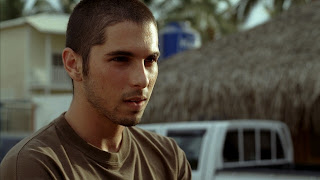 Director: Ricardo de Montreuil
Director: Ricardo de MontreuilRunning Time: 93 mins
Sat 21 Jun, 20:00
Filmhouse 2
Sun 22 Jun, 22:20
Filmhouse 2
Máncora starts in a brutal manner. Santi’s father is seen committing suicide in the same instant that Santi is having sex in a nightclub, moments after Santi has refused to answer his father’s phone call. The coarseness of this moment is, however, overcome by a film that develops the subtle tensions and complex relationships that exist between the various characters. When Santi’s half-sister, Xime comes to visit with her Cungo (half-Cuban half-Gringo) husband Iñigo, it becomes quickly apparent that she is torn between the Peru she left behind and the money-spilling arrogant values Iñigo uses in New York. Xime is full of nostalgia for the food, the songs, and the beaches of Peru, Santi is fed up with a country that has left him jobless and fatherless while Iñigo simply wishes he hadn’t been made to come. The unease between the characters become clearer on their road trip to Máncora when they pick up the laidback Brazilian, Batú, who manages to live in peace while the others cannot. To make matters worse, Santi gets into a fight with one of the locals from Mancora, calling him cholo (Indian) in an attempt at humiliation. Although each character speaks the same language, they are divided between the different cultures they come from and the class hierarchies that distinguish them. The strongest quality of the film is that it does not pass judgement on these characters but allows their tensions to bubble up, spill out and move them onwards. Máncora does not allow Santi to truly understand or resolve his fundamental problem, that people do not care to help the downtrodden, but it does offer an insight into the universal difficulty individuals have when sharing each others’ lives.




No comments:
Post a Comment